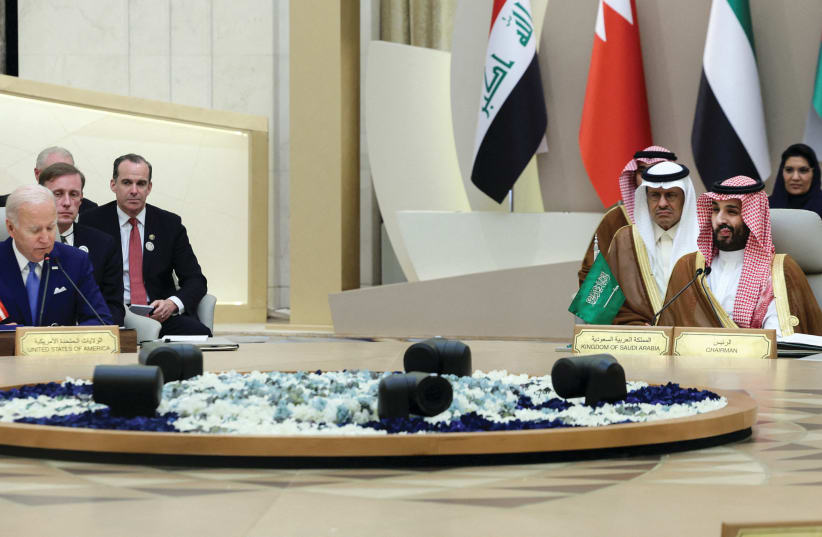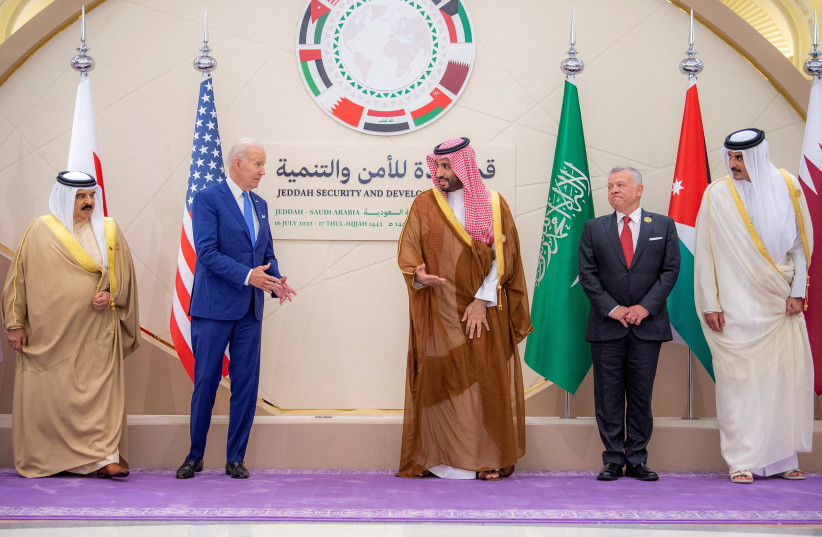US President Joe Biden’s July visit to the region substantiated the changing paradigm of geopolitics in the Middle East. Tumult has defined the region over the course of the last decade, from the aftermath of the Arab Spring to the signing of the Abraham Accords. The superpowers’ shift in conduct, new regional dynamics, and geo-ecological developments have, however, changed the reality.
While Israel served as the visit’s stepping stone, it was definitely not its most important leg. In other words, the Palestinian issue, conspicuous throughout the 20th century, is now marginal and seems to have lost its centrality. This was best reflected in the president’s remark that “the time is not ripe” for political solutions. Instead, he confined himself to economic gestures, pledging $100 million for Palestinian healthcare. Although unsustainable, the Palestinian issue has garnered less attention from Arab states too, which have instead nurtured their own individual interests amid the upheaval.
The most important part of Biden’s trip was his highly controversial visit to Saudi Arabia. Due to the ramifications of the war in Ukraine, and the rising price of crude oil (over $100 per barrel), his administration has now been forced to step in and walk back its criticism against the Saudi heir, Mohammed bin Salman, who was previously ostracized for the country’s human rights record. This represents a marked shift from its earlier decision to lessen its involvement in the region.
For Israel, these developments heralded new relationships across the wider region, including North Africa in the West, and the Arabian Peninsula in the East, adding to the neighboring states at peace with Israel, Egypt and Jordan – as well as in the Eastern Mediterranean. In this sense, it is possible to speak of a joint architecture of actors advocating for stability and rejecting the Islamist totalitarian subversion in a manner that was unimaginable even a few years ago.
Several interconnected developments propagated this new and evolving geopolitical situation. On the global level, regional actors were jolted by the US shifting of priorities, and its diminishing role in the region. American war fatigue aimed at “ending endless wars,” in conjunction with shifting strategic priorities such as combating China’s rise, has led to the region’s reduced importance.
The US is uninterested in using coercive force even against Iranian ambitions, emboldened by the 2015 nuclear deal and widespread regional instability. As such, states in the region must take stock of their own strategic positions and look for alternative security guarantors.
The search is on
THE SEARCH for a new regional security guard encouraged the Gulf’s about-face toward Israel, setting the stage for the Abraham Accords in August 2020. The country’s overwhelming military and technological superiority can balance ascendant Iran. During his visit, Biden himself faced immense pressure to do more to counter Iran. The Gulf Cooperation Council +3 summit in Jeddah was another by-product of the Abraham Accords.
The multilateral engagement and warming of the Arab states toward Israel – catalyzed by the shared threat of Iranian expansion – underscored the interest-based approach to foreign affairs in the region, casting aside previous maxims of Arab or Muslim solidarity with the Palestinians. In the new Middle East, particular state interests have eclipsed these orientations.
Recent events reflect this shift. In the Gaza Strip, not only did Hamas and the Palestinian Authority demonstrate the art of fence-sitting, but most Arab states let the events pass relatively ignored. More critical are recent developments in the Iranian nuclear deal.
The European Union, which regards Iran as an attractive market and a viable source of energy, has always been more lenient in its approach to Tehran and has now brokered a controversial “text” in coordination with US officials to close the deal.
Even by the EU’s own standards, the concessions proposed cut Iran generous slack. It remains to be seen whether the nuclear deal will materialize, but it is safe to assume that no deal will prevent Iran from conducting undeclared nuclear weapons work at several sites.
It seems that the dynamics of the West-East pendulum have come full circle. When it comes to negotiating with Iran, one should be ready to haggle: pure diplomacy without a military option in the back pocket could prove to be a recipe for disaster.
With this in mind, a wiser Israel should be ready for change as it emerges. Amid this regional transformation, Israel will face both new opportunities as well as challenges. The country must be equipped with the knowledge and proficiency in a strategic, well-balanced policy to improve and leverage its position in the Middle East through the 21st century.
The writer is the director of the Moshe Dayan Center for Middle Eastern and African Studies at Tel Aviv University. This article was written in collaboration with UK Israel Future Projects.

